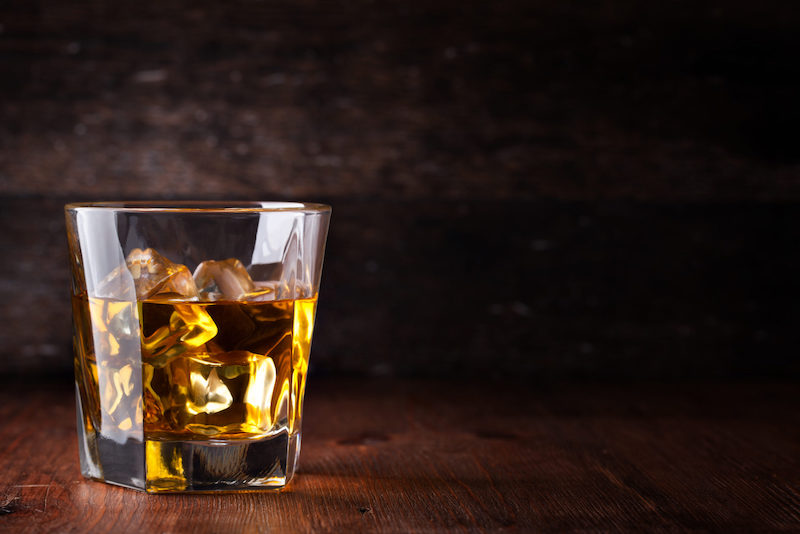“A recent Indian trademark case brings to light the challenges and legal nuances associated with preserving the distinctiveness of well-established shape marks of whiskey bottles in a competitive market.”
 In the spirited world of whiskey, legal battles ferment in the form of trademark litigation. In the vast realm of whiskey production, where brands are as carefully crafted as the spirits themselves, clashes over trademarks have become common. The legal complexities swirling within the whiskey industry encapsulate the struggles of renowned manufacturers to protect the unique identities they have painstakingly cultivated for their whiskey brands. From the nuances of trade-dress like labelling and branding, to shape marks for detailed bottle designs, whiskey companies engage in multifaceted litigations to safeguard their trademarks.
In the spirited world of whiskey, legal battles ferment in the form of trademark litigation. In the vast realm of whiskey production, where brands are as carefully crafted as the spirits themselves, clashes over trademarks have become common. The legal complexities swirling within the whiskey industry encapsulate the struggles of renowned manufacturers to protect the unique identities they have painstakingly cultivated for their whiskey brands. From the nuances of trade-dress like labelling and branding, to shape marks for detailed bottle designs, whiskey companies engage in multifaceted litigations to safeguard their trademarks.
Pouring Over Precedents: Whiskeys on Trial, be it Peter Scot or Smirnoff
These litigations have given rise to several landmark judgments in India so far. For instance, consider the case of Khoday Distilleries Limited vs. The Scotch Whisky Association & Ors. In this case, the Supreme Court rendered a verdict in favor of the petitioner, Khoday Distilleries Limited, by holding that their brand name ‘Peter Scot’ did not bear deceptive similarity to the names of the defendant’s whiskeys.
The court’s decision hinged on the crucial distinction drawn between two classes of consumers. It underscored the relevance of considering the socioeconomic status and educational background of the targeted consumers. It held that when the consumers in question are affluent and educated, a distinctive set of criteria should be applied in evaluating the likelihood of confusion between marks of competing brands.
The court acknowledged the potential for confusion in situations where products are specifically targeted at the less educated and economically disadvantaged. This nuanced approach demonstrated an understanding of the dynamics at play in the marketplace, and recognized the diversity in consumer demographics..
In another legal battle, Diageo North America Inc. and Shiva Distilleries Ltd. the parties found themselves in a courtroom clash concerning the usage of their respective brands — ‘Smirnoff’ and ‘Brisnoff.’ In this case, the court dissected the marks into distinct syllables. For the common “NOFF” syllable, the court found no exclusive rights established by the plaintiffs, noting its widespread use in relation to vodka and its potential use for indicating a Russian origin. Regarding the initial syllables, the court held that they were not deceptively similar. This judgment focused on adopting a nuanced approach in evaluating trademark similarity and emphasizing the importance of dissecting individual elements to ascertain deceptive similarity for an average person with imperfect recollection.
Decanting Justice in the Spirit of Law: Pernod Ricard’s Trademark Trials Uncorked
Pernod Ricard, known for its proactive stance in protecting its trademarks, has often found itself embroiled in legal disputes over its proprietary marks. It faced off against Rhizome Distilleries Pvt Ltd., regarding the infringement of their respective brands – ‘Imperial Blue’ and ‘Imperial Gold.’ Here, the court held that packaging the plaintiff’s name on an amber bottle does not give rise to any similarity. It explained that the term “IMPERIAL” is commonly employed by various alcohol manufacturers, indicating widespread use in the industry. Court rejected the claim that “IMPERIAL” has acquired secondary meaning for exclusivity, citing the short marketing period since 1997, as insufficient.
Pernod Ricard also made headlines for yet another trademark litigation, this time against A.B. Sugars Ltd. & Anr. In this instance, the petitioner contended that the defendant’s mark, ‘Indian Stag,’ bore a deceptive similarity to their own distinguished mark, ‘Royal Stag.’ Interestingly, this judgment distinguished between infringement and passing-off, emphasizing a higher standard of proof for the latter. Due to the defendant’s Indian-made foreign liquor (IMFL) being manufactured exclusively for export, the court noted that there would be reduced confusion among foreign customers, lowering the likelihood of passing off.
Pernod Ricard was engaged in another noteworthy legal battle, this time against United Spirits Limited. The said suit was a ‘battle of pride’ as the petitioner, Pernod Ricard, stood firm in defense of their prized ‘Blenders Pride’ brand, while the defendant, United Spirits Limited, laid claim to the ‘Royal Challenge American Pride’ whiskey brand. The Punjab & Haryana High Court dismissed the appeal by observing that, the “similarities of a single word cannot be taken as an infringement or passing off.”
A Top-Shelf Trademark: Blender’s Pride Tiff takes Center Stage
Ina more recent case filed by Pernod Ricard, the company took legal action by filing a Special Leave Petition (SLP) in the Supreme Court with respect to its of ‘Blender’s Pride’ Whiskey.
The petition was filed in response to an order of the Madhya Pradesh High Court, which had denied the grant of an interim injunction for an alleged infringement of the ‘Blender’s Pride’ mark due to the use of ‘London Pride’ Whiskey by Karanveer Singh Chhabra. The heart of the dispute revolved around the contention that the use of ‘London Pride’ Whiskey posed a threat to the distinctive identity and reputation of ‘Blender’s Pride’ in the market because the former was deceptively similar to the latter.
The proceedings escalated on January 5 2024, when a three-judge bench of Justices D.Y. Chandrachud, J.B. Pardiwala, and Manoj Misra granted the plea for a stay on the order. The issuance of the notice indicated that the Supreme Court was willing to delve into the merits of the case and consider the arguments put forth by both parties.
A Demonstrative Drama in the Court
Senior Advocate Mukul Rohatgi was representing the petitioners and he skilfully explained the striking similarities between the contested brands during the court proceedings. With an air of conviction, Rohatgi asserted, “There can’t be a better copy, if I may say so, I have put in the photograph but it is better to see.” In a compelling display, he then placed the bottles of the petitioner’s brands, Blender’s Pride and Imperial Blue, on the dais, for the bench to scrutinize. Emphasizing the well-known nature of these marks, he stated that both brands boasted substantial revenue of around USD 250 million each.
Delving into the core of the matter, he noted that, with respect to Imperial Blue, the alleged infringement primarily revolved around the identical bottle design. Rohatgi spoke on trade-dress and highlighted that, “Something worse, the bottle is absolutely identical, Seagram is also mine, they are using it. They are getting it either manufactured from somewhere else or getting from kabaadi, because they can’t get Seagram.”
The senior advocate pointed out a three-pronged violation which included: the registered mark, the packaging and the bottling. The CJI referred to his own Bombay High Court judgment of 2011, Gorbatschow Wodka Kg v. John Distilleries Limited, which dealt with a comparable passing-off issue related to a vodka bottle’s shape. Mr. Rohatgi agreed with the relevance of the case with regard to trade design, and said the present case drew upon the same precedent.
So, as Pernod Ricard seeks legal recourse to protect its brand, the case brings to light the challenges and legal nuances associated with preserving the distinctiveness of well-established shape marks of whiskey bottles in a competitive market. The outcome of this legal battle could potentially set precedents and further shape the landscape of Indian trademark law within the spirits industry.
Image Source: Deposit Photos
Image ID:54446955
Copyright:gresey

![[IPWatchdog Logo]](https://ipwatchdog.com/wp-content/themes/IPWatchdog%20-%202023/assets/images/temp/logo-small@2x.png)

![[Advertisement]](https://ipwatchdog.com/wp-content/uploads/2024/04/UnitedLex-May-2-2024-sidebar-700x500-1.jpg)
![[Advertisement]](https://ipwatchdog.com/wp-content/uploads/2024/05/Quartz-IP-May-9-2024-sidebar-700x500-1.jpg)
![[Advertisement]](https://ipwatchdog.com/wp-content/uploads/2024/04/Patent-Litigation-Masters-2024-sidebar-700x500-1.jpg)

![[Advertisement]](https://ipwatchdog.com/wp-content/uploads/2021/12/WEBINAR-336-x-280-px.png)
![[Advertisement]](https://ipwatchdog.com/wp-content/uploads/2021/12/2021-Patent-Practice-on-Demand-recorded-Feb-2021-336-x-280.jpg)
![[Advertisement]](https://ipwatchdog.com/wp-content/uploads/2021/12/Ad-4-The-Invent-Patent-System™.png)







Join the Discussion
No comments yet.